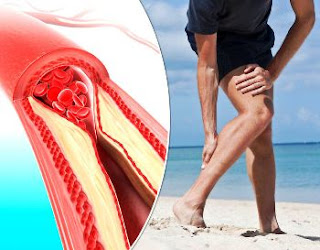What is peripheral vascular disease?
Peripheral Artery Disease, Peripheral Vascular Disease or PAD is a heart condition similar to that of coronary artery disease and carotid artery disease. In PAD, the fatty deposits build up in the inner linings of the artery walls. These blockages restrict the blood flow circulation, mainly in arteries leading to the kidneys, stomach, arms, legs and feet.
In its early stages, a common symptom is cramping, or fatigue in the legs and buttocks during activity. Such cramping subsides when the person stands still. This is called "intermittent claudication." People with PAD often have fatty buildup in the arteries of the heart and brain. Because of this association, most people with Peripheral Vascular Disease have a higher risk of death from heart attack and stroke.
There are two types of these circulation disorders:
Functional peripheral vascular diseases don't have an organic cause. They don't involve defects in blood vessels' structure. They're usually short-term effects related to "spasm" that may come and go. Raynaud's disease is an example. It can be triggered by cold temperatures, emotional stress, working with vibrating machinery or smoking.
Organic peripheral vascular diseases are caused by structural changes in the blood vessels, such as inflammation and tissue damage. Peripheral artery disease is an example. It's caused by fatty buildups in arteries that block normal blood flow.
How is peripheral artery disease diagnosed and treated?
Techniques used to diagnose PAD include a medical history, physical exam, ultrasound, X-ray angiography and magnetic resonance imaging angiography (MRA).
Most people with PAD can be treated with lifestyle changes, medications or both. Lifestyle changes to lower your risk include stopping smoking, diabetes control and blood pressure. Become physically active; eat a low-saturated-fat, low-cholesterol diet.
Peripheral Vascular Disease, PAD may require drug treatment, too. Drugs include medicines to help improve walking distance, antiplatelet agents and cholesterol-lowering agents (statins).
Provided by the publishers of green coffee beans and extenze reviews. Visit our websites for more specialized health information and reviews.
Subscribe to:
Post Comments (Atom)
Popular Posts
-
Do you suffer from allergies? If you do, you may be looking for natural ways to seek relief. The good news is that you do have a number o...
-
A key ingredient to improving your lifestyle and living a healthy life is antioxidants. There are several antioxidant supplements out ther...
-
According to past research and studies, nearly 80% of all Americans will experience some type of back pain in their lives. The American Ac...
-
Within the first two to three days after you have given birth, you may discover that your breasts feel swollen, tender, throbbing, lumpy, ...






No comments:
Post a Comment